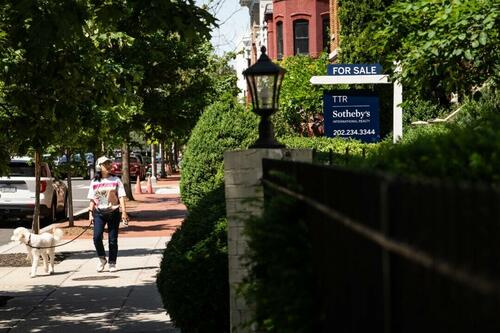US Homeownership Tenure Hits Highest Level In 25 Years
U.S. homeowners who sold their properties in the third quarter of 2025 had owned them for an average of 8.39 years, the longest tenure in at least 25 years, real estate analytics company ATTOM said in a statement released on Oct. 21.
The longer homeownership tenure reflects “a mix of factors shaping the 2025 housing market,” the company stated.
“Higher mortgage rates may have made homeowners less likely to move, as many remain locked into historically low rates from prior years,” the statement reads.
“Limited inventory and elevated home prices may have also made finding an affordable next home difficult, keeping potential sellers in place longer.”
The state with the longest average homeownership tenure in the third quarter was Massachusetts at 12.91 years.
This was closely followed by Connecticut at 12.66 years, California at 11.2 years, Rhode Island at 11 years, and Washington state at 10.74 years.
Maine had the shortest average homeownership tenure at 4.8 years, followed by Mississippi at 5.71 years, South Dakota at 5.79 years, West Virginia at 6.04 years, and Georgia at 6.11 years.
As Naveen Athrappully reports for The Epoch Times, according to ATTOM, all-cash sales continued to rise in the third quarter, with 38.9 percent of all homes sold nationwide during this period being all-cash deals, up from 37.6 percent in the third quarter of 2024.
“The increase in all‑cash sales suggests a larger share of buyers may be avoiding financing altogether, potentially investors or downsizing homeowners using accumulated equity, which continues to influence both mobility and overall market dynamics,” ATTOM stated.
Homeowners who sold off their properties in the third quarter made a 49.9 percent profit on a typical single-family home or condo, ATTOM said in an Oct. 16 statement.
While this is slightly lower than the 55.4 percent profit seen during the third quarter of 2024, it is still way higher than the roughly 30 percent profit margin home sellers saw before 2020, according to the company.
Since the COVID-19 pandemic, home prices have surged, contributing to massive profits for owners willing to sell.
According to data from the Federal Reserve Bank of St. Louis, the average sale price of homes sold in the United States in the second quarter was $512,800, up from $371,100 five years ago in the second quarter of 2020.
“Profit margins remained steady and high throughout the traditionally busier summer selling season,” ATTOM CEO Rob Barber said.
“While continuously rising prices could have chased away buyers and slackened demand, the recent dip in mortgage rates may be helping to keep more people in the market.”
Even though high home prices are giving large profits to sellers who have held on to their properties since the COVID-19 pandemic, selling has become more difficult.
New listings of homes for sale rose by 4.1 percent year over year for the four weeks ending Oct. 12, the largest increase in four months. This came amid buyers backing off from the market, real estate brokerage Redfin said in an Oct. 16 statement.
High sale prices and financial unease stemming from concerns about the ongoing federal government shutdown and tariffs have made many buyers wary of committing to property purchases, the brokerage stated.
Jo Chavez, a Redfin Premier agent in Kansas City, Missouri, cited elevated mortgage rates as another factor deterring buyers from the market.
“Even though rates have come down from their peak, a lot of people are waiting for sub-6 percent rates before they buy,” Chavez said.
Mortgage Rate Issues
The average weekly rate of a 30-year fixed-rate mortgage was 6.27 percent for the week ending Oct. 16, according to data from Freddie Mac. Since June, the rates have been mostly in a downward trend.
While the current 6.27 percent rate is lower than the 7.04 percent yearly peak in January, rates are still well above the levels seen during the initial COVID-19 pandemic period. For instance, five years ago, the rate was 2.81 percent.
In an Oct. 16 commentary, Lisa Sturtevant, chief economist at real estate data company Bright MLS, suggested that the recent dip in mortgage rates may trigger more competition among buyers, pushing up home prices.
“Looking ahead to the rest of the year, it is difficult to forecast where rates will go, but the likely bet is that they are not going to fall much further,“ she wrote. ”Buyers who think they want to wait for lower rates could find themselves facing higher prices but without an improvement in mortgage rates.
“It is actually possible that mortgage rates could increase in the coming weeks. The Federal Reserve has been rolling mortgage-backed securities off of the central bank’s balance sheet, which could lead to upward pressure on mortgage rates.”
Tyler Durden
Tue, 11/04/2025 – 14:05ZeroHedge NewsRead More





 R1
R1
 T1
T1


